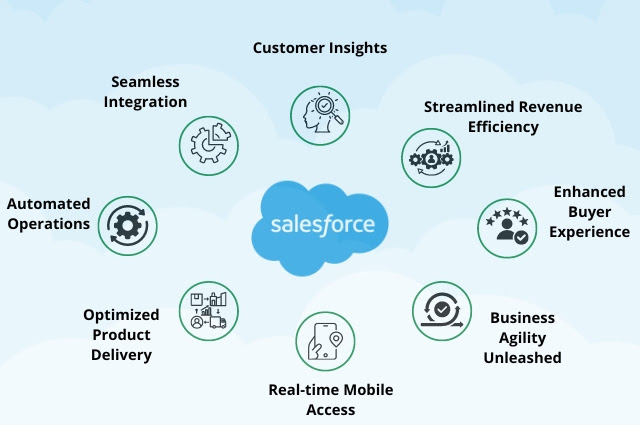5 Ways Salesforce Revenue Cloud Boosts Sales Efficiency and Accelerates Deals
In today's competitive landscape, businesses are constantly seeking ways to optimize their sales processes and close deals faster. Salesforce Revenue Cloud emerges as a powerful, unified platform designed to do just that. By integrating Configure, Price, Quote (CPQ), Billing, Partner Relationship Management (PRM), and Revenue Recognition, it streamlines the entire quote-to-cash lifecycle, empowering sales teams and accelerating revenue growth.
Here are five key ways Salesforce Revenue Cloud boosts sales efficiency and accelerates deals:
1. Streamlined Quoting with CPQ: Faster, More Accurate Proposals
One of the most significant bottlenecks in the sales cycle is often the quoting process. Manual quote generation, complex product configurations, and inconsistent pricing can lead to errors, delays, and a frustrating experience for both sales reps and customers.
Salesforce CPQ, a core component of Revenue Cloud, automates and simplifies this. Sales reps can:
Configure complex products with ease: Guided selling helps reps choose the right products and bundles based on customer needs, even for highly customizable offerings.
Generate accurate quotes instantly: Pricing rules, discounts, and terms are automatically applied, eliminating manual calculations and ensuring consistency.
Reduce approval cycles: Automated workflows route quotes to the necessary stakeholders (e.g., managers, finance, legal) for quick review and approval, cutting down on back-and-forth communication.
This efficiency translates directly to faster quote delivery and a more professional, error-free presentation, which significantly accelerates deal closures.
2. Automated Billing and Revenue Recognition: From Quote to Cash Seamlessly
The journey doesn't end when a deal is closed. Invoicing, payment collection, and revenue recognition can be equally complex and time-consuming, especially for businesses with subscription or usage-based models. Salesforce Billing within Revenue Cloud automates these critical post-sale activities:
Effortless invoicing: Invoices are automatically generated based on approved quotes and contracts, reducing manual effort and minimizing errors.
Flexible billing models: Supports various pricing structures, including one-time, subscription, and usage-based billing, ensuring accurate and timely billing regardless of complexity.
Compliant revenue recognition: Automates revenue recognition in accordance with accounting standards like ASC 606 and IFRS 15, providing audit-ready financial records and improving compliance.
By automating these processes, businesses can improve cash flow, reduce administrative overhead, and free up finance teams to focus on strategic initiatives, indirectly accelerating future deals by ensuring a smooth post-sale experience.
3. Unified Product Catalog and Pricing: Consistency Across All Channels
Disjointed product and pricing data across different systems can lead to inconsistencies, errors, and wasted time for sales reps. Salesforce Revenue Cloud provides a single, unified product catalog that serves as the source of truth across all sales channels – direct sales, partners, and even e-commerce.
This centralization ensures:
Consistent pricing: All sales channels access the same, up-to-date pricing information, preventing price discrepancies and disputes.
Simplified product management: New products, bundles, and pricing updates can be managed in one place, reducing the effort and time required to bring new offerings to market.
Improved data accuracy: A single source of truth minimizes data entry errors and ensures that all teams are working with the most current information.
This consistency fosters trust with customers and allows sales teams to operate with greater confidence and efficiency.
4. Enhanced Visibility and Collaboration: Breaking Down Silos
Salesforce Revenue Cloud fosters seamless collaboration between sales, finance, and operations teams by providing a unified view of customer and revenue data. This connected ecosystem means:
360-degree customer view: Sales reps have access to comprehensive customer history, including previous purchases, contract details, and billing information, enabling more personalized and effective interactions.
Reduced handoffs and delays: Automated workflows and shared data minimize the need for manual data transfer and reconciliation between departments, accelerating the entire lead-to-cash process.
Data-driven insights: Real-time dashboards and analytics provide valuable insights into revenue performance, pipeline health, and customer behavior, enabling better forecasting and strategic decision-making.
By breaking down departmental silos and promoting transparency, Revenue Cloud ensures that everyone is on the same page, leading to quicker approvals and a more cohesive sales effort.
Also read : Salesforce Revenue Cloud vs. CPQ: Key Differences and When to Choose Which
5. AI-Powered Insights and Guided Selling: Empowering Sales Reps
Leveraging the power of Salesforce's AI capabilities, Revenue Cloud empowers sales representatives to be more effective and efficient:
Intelligent product and bundle recommendations: AI-powered guided selling suggests the best products and configurations based on customer needs and past buying patterns, increasing deal size and relevance.
Optimized discounting: AI can help analyze pricing data to suggest optimal discounts, balancing competitiveness with profitability.
Proactive renewal management: Automated alerts and workflows for expiring contracts enable sales teams to proactively engage with customers for renewals and identify upsell opportunities, preventing churn and securing recurring revenue.
By providing sales reps with intelligent tools and insights, Salesforce Revenue Cloud helps them focus on value-added activities, close deals faster, and ultimately drive greater revenue for the business.
In conclusion, Salesforce Revenue Cloud is more than just a collection of tools; it's a strategic platform that unifies and optimizes the entire revenue lifecycle. By enhancing sales efficiency through streamlined quoting, automated billing, unified data, improved collaboration, and AI-powered insights, it empowers businesses to accelerate deals, boost revenue, and achieve sustainable growth.




Comments
Post a Comment